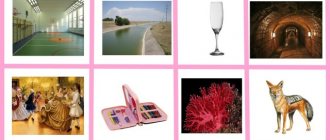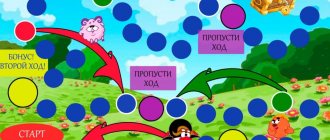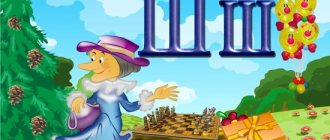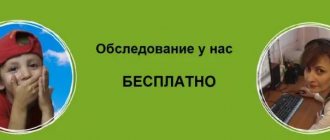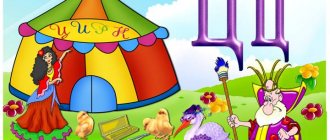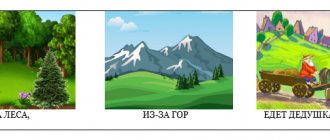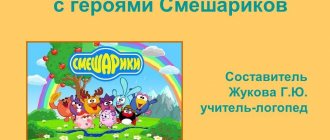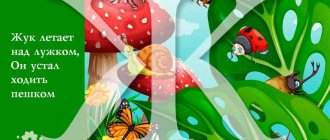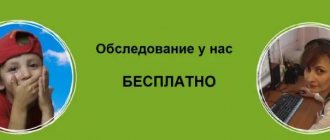Automation of the sound “L” in pure tongues using mnemonic tracks is carried out after automation in syllables, words and phrases. Classes on automation in sentences can be carried out both before and after phrases.
At the initial stages, when pronouncing the sound L, you need to bite the tip of your tongue. Later, when the sound is pronounced easily, we move the tongue behind the upper teeth.
Helpful Tips:
- At the beginning of each lesson on automating the sound “L” we conduct 2-3 articulatory gymnastics exercises.
- During the lesson, ensure the correct articulation of the sound “L” (see articulatory gymnastics).
- Classes are held regularly for 20-25 minutes depending on the age of the child and alternating play exercises.
- At the first signs of fatigue, take a physical minute. Kinesiological exercises are very useful for relieving tension and emotional relaxation.
- Classes should be conducted in a friendly and comfortable environment for the child.
- If the child has already mastered the correct pronunciation of the sound “L”, then the lessons can be made active. Walk, climb, jump, repeating rhythmic phrases. Learn them and use them. like counting rhymes, songs, etc.
Automation of the sound “L” in pure phrases, as in sentences, develops associative thinking. The child needs to match each word with the picture and name it.
Mnemonic tracks of pure tongues will also introduce children to prepositions and will be able to visually designate this “invisible” word using model diagrams.
Preposition models:
Automation of the L sound in words
1. We found burbot in the shallows.
2. Lenya climbed the ladder and picked Lenya’s peaches. Lenya rolled down the stairs with songs and peaches. 3. People cherish bread in the fields and spare no effort for bread. 4. Lara plays the piano at Lyalya’s. 5. Lara plays the piano at Valya’s. 6. Vera told Lera not to cry. 7. Clara and Valerka have dumplings on their plate. 8. For Lyuba and Lyudochka - pancakes on a plate. 9. Kolya stabs stakes, fields field flight. 10. Marina Galina called for raspberries, Galina called Marina for viburnum (S. Pogorelovsky). 11. Kolya breaks the ice with a crowbar, Klim puts ice in the cart. 12. Olya ironed diapers for little Alenka. 13. There is a shock with a little underfoot. 14. Our Polkan fell into a trap. 10. Lena was looking for a pin, and the pin fell under the bench. I was too lazy to crawl under the bench; I searched for the pin all day. I was looking for a pin all day. 11. Klim arrived from Klin to Crimea. 12. A fisherman is catching fish; the entire catch floats into the river. 13. Uncle Kolya gave his daughter Polya a collie puppy, but the collie puppy ran away from Polya into the field. 14. The ship was carrying caramel, the ship ran aground. And the sailors ate caramel aground for three weeks. 15. There is a cap, the cap is knitted, but not in the Kolpakov style. 16. There is a priest on a head, a cap on the priest, a head under the priest, a priest under a cap. 17. Swans flew with swans. 18. The rabbit jumps around the beds deftly - the rabbit steals carrots from the garden. 19. Corey Kirill: “Don’t tease the gorilla!” They reproached the gorilla: “Don’t tease Kirill!” 20. Either Borya bought a roll of roofing felt for Tolya, or Tolya bought a roll of roofing felt for Borya. 21. Lara took eclairs for Lera. Lara and Lera's eclairs with cream. 22. Lyalya has a Lelya doll. Lyalya is made of linen - Lyalya likes it. 23. Olga and Galya did not lie to Oleg in the meadow. 24. The fox runs along the six: lick, fox, sand. 25. The liar put it in the chest, and the liar took it from the chest. 26. On the street, Lavrenty is with a bast shoe, with a nine - in public, Lavrenty has no time for bast shoes, or nine (weight, measure, counting, connecting nine units). 27. Crucian carp, don’t climb into the hole, the crucian carp is stuck in the hole. 28. Polya went to weed parsley in the field. 29. The field is not weeded, the field is not watered, the little pole asks for a drink, the little pole needs to be watered. 30. In the Polya-Polyushka field, the pole-polyushka flight. There will be no weeds in the field if the field is flying. (S. Pogorelovsky)
Pure sayings for the sound “s”
Pure sayings for children 5 years old are used at the initial stages of automation. Children of primary preschool age can easily learn them. The sound “s” is one of the basic phonemes, so it is corrected starting from 2-3 years.
| Syllables | Pure talk |
| SA |
|
| SU |
|
| SY | There is a wasp's house. |
| SI | The plane has landing gear. |
| AC | Squirrel stocked up. |
| EU | How beautiful the autumn forest is. |
| OS |
|
| US | The bus stopped here. |
| WASPES | The apricots are ripe. |
| SYATA | The piglets came running. |
| DREAM | We will assemble the squash. |
Pure speeches are combined with other exercises to automate sound. They are a transitional stage from syllables to words. The material proposed above for speech therapy classes will help to consolidate the correct articulation of the whistling group.
Pure sayings starting with the sound “r”
Pure sayings with the sound “r” are not suitable for children of primary preschool age, because sonors appear in children’s speech starting from the age of 5. Until this time, the articulatory apparatus is not ready to pronounce them.
| Syllables | Pure talk |
| RA |
|
| RO |
|
| RU |
|
| RY |
|
| RI | The bullfinches have arrived. |
| AR |
|
| OR |
|
| UR | We'll go feed the chickens. |
| GENUS | We are digging a garden. |
| ORY |
|
In pure phrasing with the sound “r”, you should try not to use words with the sound “l”. During speech therapy classes, material is selected taking into account the sound being practiced. If the phoneme in direct syllables is automated, then pure phrasing should contain this type of syllables.
Pure sayings for the sound “zh”
Pure pronouncements for 5-year-old children on the sound “zh” help automate the correct pronunciation of one of the basic sounds of the hissing group.
About autumn:
- ZHI-ZHI-ZHI - collected ears of rye;
- ZHI-ZHI-ZHI - hedgehogs are getting ready to sleep;
- ZHAI-ZHAI-ZHAI - the autumn harvest has ripened.
About wild animals:
- ZHA-ZHA-ZHA - we met a hedgehog in the forest;
- ZHU-ZHU-ZHU - we will give berries to the hedgehog;
- ZHI-ZHI-ZHI - hedgehogs live in the forest.
There are not many pure phrases for the sound “zh”, due to the deafening of the voiced phoneme in reverse syllables.
Most often, children do not have difficulty automating this sound, because the correct basic articulation of hissing sounds has already been formed. The main thing is that the adult pronounces the voiced phoneme loudly so that the child does not confuse it with another sound.
Riddles Come learn to shoot with me, Look for me in the garden. I can hit a bird accurately, but more often I hit cabbage soup. (Onion) Hidden in this smooth Bronze-colored box is a small oak tree of Future Summer. (Acorn) We compose and rhyme poems The snow is falling quietly, White snow, shaggy. We will clear the snow and ice in the yard…….(with a shovel). The cheerful rain is falling, You and I are friends! It’s good for us to run barefoot through……..(puddles) Pure sayings La-la-la, delicious honey is carried by……..(bee). Lu-lu-lu, we saw…….(bee). Ly-ly-ly, we were scared…….(bees).
Game “Answer” What are they sawing with? (Saw) What do you eat soup with? (With a spoon) How do you wash your palms? (With soap) What do you use to dig the ground? (With a shovel) How do you hammer a nail? (With a hammer) How do you break thick ice? (With a crowbar) Correct the mistakes Katya ate noodles. Mila sat down on the bench. The boat was rocking on the water. Volodya was carrying a white dove(). Mila saw a white moon.
Poems Mouse The mouse lived happily, Sleeping on fluff in the corner. The mouse ate bread and lard. But everything was not enough for the mouse. M. Fomicheva
Broom Broom was sweeping the floor. Broom is very tired. He sneezed, he yawned, and quietly lay down under the chair. L. Zubkova
Soldier Tin soldier lived. He sang, joked and did not bother. He fought and never got tired. And he fell and got up himself. And he always remembered in battle His soldier’s family, Where he was for everyone, and every one of them stood for him! V. Aushev
White color White snow, white chalk, The white hare is also white. But the squirrel is not white, it wasn’t even white. E. Izmailov
Winter Everything is white, white, white. There was a lot of snow. These are fun days! All on skis and skates! A. Bogomolova
Game “Say the other way around” The crane lifted the load, and then...... The plane arrived, and then..... The hare galloped into the garden, and then..... Sasha put on his coat, and then..... Grandfather sat down on the sofa, and then...... Petya took off his boots, and then.....
Tongue Twisters The woodpecker hollowed out, hollowed out and hollowed out a hollow. It was dry and warm. Malanya, the chatterbox, chattered and chattered and blurted out the milk.
Fairy tales
Listen carefully to the story. Remember and name the words from the story with the sound “L”. Retell the story.
Cat Neil Cat Neil loves to sleep. So he entered and went under the bench. He stretched out, covered himself with his paw and fell asleep. I slept to my heart's content. Neil the cat stood up, yawned and stretched. And then he began to wash himself with his paw. A. Bogomolova We tell the story together with the baby
Elephants. When free, elephants live in the jungle. In India, people ride elephants. And here you can see elephants only in the elephant colony. The next day, Slava saw large, strong elephants with their calves in the elephant sanctuary. Slava admired the mighty elephants and the cheerful little elephants. He came very close to the elephants and saw their tusks. At home, Slava wrote a fairy tale about elephants. According to V. Konovalenko, S. Konovalenko
Listen carefully to the story “The Jackdaw Wanted to Drink” and remember the words with the sound “L”. Retell it. Remember and name the words from the story with the sound “L”. The jackdaw wanted to drink. I saw: there was a jug of water, and the water in it was at the very bottom. The jackdaw jumped and jumped - all to no avail. The jackdaw couldn't get water. And the jackdaw began throwing pebbles into the jug. She threw and threw and threw so much that the water rose and the jackdaw was able to drink. According to L. Tolstoy
Listen carefully to the fairy tale and remember the words with the sound “L”. Listen to the story again and retell it.
Squirrel and wolf. The squirrel jumped from branch to branch and fell on a sleepy wolf. The wolf jumped up and wanted to eat her. The squirrel began to beg him: “Let me go, Wolf.” The wolf said: “I’ll let you go, just tell me why you squirrels are always cheerful, but I’m always bored?” When the squirrel was on the tree, she said to the wolf: “You are bored because you are angry. And we squirrels are cheerful, because we don’t do harm to anyone.” She said and ran away. According to L. Tolstoy
Pure sayings for the sound “z”
Pure sayings for 5-year-old children on the sound “z” help to consolidate the basic articulation of whistling sounds. There are not many of them, because in reverse syllables the voiced phoneme is deafened. Therefore, they select material for practicing sound images in straight syllables or between vowels.
Pure sayings will be more beneficial for children if you turn learning into a game
About spring:
- ZY-ZY-ZY – birch leaves appeared;
- FOR-ZA-ZA - here comes the May thunderstorm.
About winter:
- ZY-ZY-ZY – severe frosts in winter;
- ZY-ZY-ZY – the snow shines like diamonds;
- RAM-RAM-RAM – we write letters to Santa Claus.
About pets:
- FOR-ZA-ZA – the goat went for a walk;
- ZU-ZU-ZU – we found a goat;
- ZY-ZY-ZY – a beautiful bow on a goat.
About transport:
- ZY-ZY-ZY – the car carries loads;
- FOR-ZA-ZA – I’ll hit the brakes.
About insects:
- FOR-ZA-ZA - a dragonfly flies towards us;
- ZU-ZU-ZU – we caught a dragonfly.
In classes, speech therapists use both pure sayings and short poems at the same time so that the process of automating “z” goes faster. Words should be selected so that the voiced sound is in a strong position, otherwise the child will confuse it with other whistling sounds.
Sound automation [L]
- Speech therapist.No
- Automation of sounds
- Sound automation [L]
The hard consonant sound [L] is colored blue (hard consonant). Vowel sounds are colored red.
The sound [L_] is pronounced for a long time and only with a motionless tongue (see articulation of the sound [L]).
1) Pronounce (read) syllables with the sound [L_]
Sample: al__, ol__, st__, yl__, el__, il__, el__, yol__, yul__, yal__
2) Pronounce (read) words with the sound [L] at the end
Sample: floor__, y-goal__
|
|
|
|
|
3) Pronounce (read) words with the sound [l] in the middle
Sample: floor, and head
|
|
|
|
4) Pronounce (read) the syllables L__A, A__O, L__U, L__Y, L__E
5) Pronounce (read) words with the sound [L] at the beginning
Sample: l__ak, l__a-pa
|
|
|
|
|
6) Pronounce (read) words with the sound [l] in the middle
Sample: ka-l__ach, sa-l__at
|
|
|
|
7) Pronounce (read) syllables
Sample: k-l__a, k-l__o, k-l__u, k-l__y
|
|
 Pronounce (read) words with a combination of consonants with the sound [L]
Pronounce (read) words with a combination of consonants with the sound [L]
Sample: f-l__ag, p-l__a-val__
|
|
|
|
9) Pronounce (read) words with two sounds [l]
Sample: f-l__ag, p-l__a-val__
|
|
|
|
10) Pronounce (read) phrases
Sample: SAMPLE: White ha-l__at
- Blue dress.
- Bright moon.
- Bad boat.
- Yellow scarf.
- Broken saw.
- Cold basement.
- Hungry wolf.
- Thick stick.
- Heavy hammer.
- Ripe strawberries.
- A warm coat.
- A spiky tree.
- Tin soldier.
- Golden ear.
- Blue eyes.
- Silk blouse.
- Deep well.
11) Conjugate sentences
- I ate milk noodles.
- I bought a notepad and chalk.
- I broke my bike.
- I was sailing on a boat on the waves.
- I ate ripe strawberries.
Sample:
- I drank cold milk.
- You drank cold milk.
- He (she) drank cold milk.
- We drank cold milk.
- You drank cold milk.
- They drank cold milk.
12) Say (read) sentences
Sample: Mi-l__a pi-l__a mo-l__o-ko
- There was a table next to the table.
- Volodya went to the collective farm.
- Alla bought a white dress.
- Mila carried the blue flag.
- A boat floats on the waves.
- Klava clapped her hands.
- Klusha swept the floor.
- The elephant has white tusks.
- The squirrel was sitting near the hollow.
- Klava bought onions and beets.
- Mila ate strawberries from a basket.
- Nikolai broke his bike.
- Volodya forgot where he put his pencil case.
13) Pronounce (read) pure sayings
- He sat down and ate everything.
- Near the bell stake.
- Klava deftly chopped the onion.
- Mom didn’t spare soap; mom washed Mila with soap.
- The stake is near the table, the table is near the stake.
- Polkan pushed the stick with his paw.
- Alyonka sat down in the corner - Alyonka had a lot to do.
- The nightingale is not great, but its voice is golden.
- Put off idleness, but don’t put off doing things.
- A cap under a cap, a cap under a cap.
- Here the cheerful bun rolled like a ball.
- Fyokla’s beets were wet and dry.
- Slava swam on a raft and caught roaches from the raft.
14) Pronounce (read) and retell the text
Naughty
Mila had a cat. He was completely white. Mila named him Belyak. Belyak was a big naughty man. One day Mom was knitting new socks for Mila. There was a ball on the table. Mom left the room and left the ball on the table. The white hare jumps onto the chair, from the chair onto the table, and let’s push the ball with his paws. The hare pushed and pushed the ball and tangled all the threads. Mila entered the room, saw a ball on the floor and said: “Oh, what a naughty man you are, Belyak!”
15) Say (read) poems
White snow, white chalk, The white hare is also white. But the squirrel is not white, the squirrel was not white.
Grandfather planted onions and grew an onion. The grandson saw the bow and tore off the forelock of the bow.
Klava deftly chopped onions, Lala washed the floor and shelves, Volodya knocked out the dust, Valya hammered nails, Kolya merrily sawed, Anatoly washed the forks, and little Sveta ate sweet candies.
- White hare, white hare! Where did you run after the bast? The white hare answered: “I didn’t run, I galloped.”
16) Pronounce (read) and memorize a poem
Clown weirdo
The weirdo clown did everything wrong: He dug with a crowbar, broke with a shovel. He sewed with a chisel and chiseled with a needle. He sawed with a cleaver, stabbed with a saw. I used a broom to whitewash and chalk with a brush.
Pure sayings for the sound “h”
The sound "Ch" belongs to the hissing group. It is staged after correcting the pronunciation of “sh” and “zh”. There are not many words with the sound “ch”, so the pure words are divided by syllables.
| Straight syllables | Reverse syllables | Other syllables |
CHA:
| AC:
| ACCA:
|
| OC-OC-OC - Night has fallen. | POINTS:
|
CHU:
| UC:
| UCHA:
|
CHI:
| ICH:
| ICHKA:
|
Pure phrases on the sound “ch” help to consolidate the correct articulation of sibilants. Children should clearly pronounce all sounds, which has a positive effect on diction. For a 5-year-old child, material with complex words corresponding to the level of his vocabulary is suitable.
